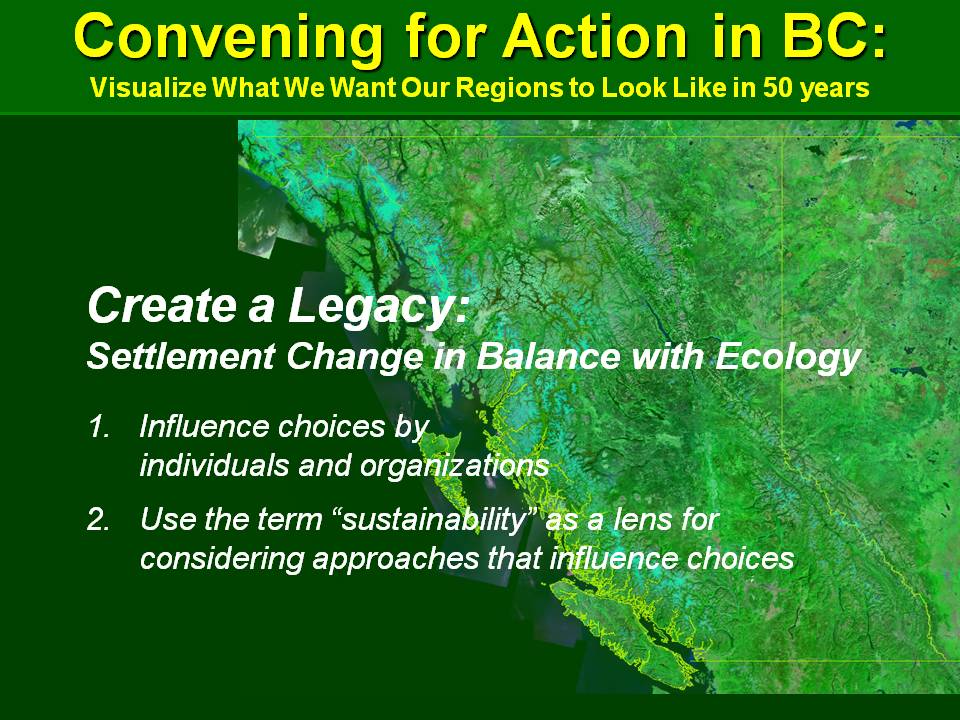BCWWA Water Sustainability Committee was the genesis for the “Partnership for Water Sustainability in British Columbia”, an autonomous society
The Partnership for Water Sustainability
The 2010 Land Awards Gala, an event hosted by the Real Estate Foundation of British Columbia on November 18, provided a platform for announcing incorporation of the Partnership for Water Sustainability in British Columbia as an autonomous society.
WSC Genesis
 “The Partnership had its genesis in the Water Sustainability Committee, known to many by the acronym WSC, a technical committee of the BC Water & Waste Association. From 2003 through 2010, the WSC was the hub for a partnership network operating in the local government setting. Going forward, the Partnership is now that hub,” states Tim Pringle.
“The Partnership had its genesis in the Water Sustainability Committee, known to many by the acronym WSC, a technical committee of the BC Water & Waste Association. From 2003 through 2010, the WSC was the hub for a partnership network operating in the local government setting. Going forward, the Partnership is now that hub,” states Tim Pringle.
Tim Pringle is a founding Director and the first President. He was Executive Director of the Real Estate Foundation from its founding in 1988 until 2008. Over the past decade, the Foundation has provided sustaining funding for initiatives undertaken by the WSC.
The Partnership has a total of five Directors. Two were WSC Vice-Chairs, namely: Ted van der Gulik, the Chair of the Water Balance Model Partnership; and Mike Tanner, the Chair of the Water Bucket Website Partnership.
The other Directors are Richard Boase, Co-Chair of the Water Balance Model Partnership; and Peter Law, representing the Convening for Action on Vancouver Island (CAVI) initiative.
Kim Stephens is Executive Director. He will continue to carry out his responsibilities as Program Coordinator for the Water Sustainability Action Plan for British Columbia.
Hub for a ‘Convening for Action’ Network
“The Partnership is the evolution of many initiatives around water sustainability in British Columbia. The Partnership is building on and continuing the work that has gone on before under the umbrella of the Water Sustainability Action Plan.”
“The Action Plan has led to growing collaboration regarding the role of water sustainability in shaping our communities. Water sustainability is a metaphor for managing the built environment sustainably. Incorporating the Partnership as a legal entity is a natural outcome. This demonstrated record of collaboration is our strength going forward,” concludes Tim Pringle.
 “Yes indeed, a strength of the Partnership is that we can cross regional boundaries with comfort and draw players together for the benefit of the whole, and as a result, encourage an inclusive sustainability vision for Vancouver Island and beyond,” adds Eric Bonham, a founding member of CAVI and the Partnership, and Past-Chair of the Highlands Stewardship Foundation in the Capital Region.
“Yes indeed, a strength of the Partnership is that we can cross regional boundaries with comfort and draw players together for the benefit of the whole, and as a result, encourage an inclusive sustainability vision for Vancouver Island and beyond,” adds Eric Bonham, a founding member of CAVI and the Partnership, and Past-Chair of the Highlands Stewardship Foundation in the Capital Region.
To Learn More:
Click on Partnership for Water Sustainability has a role in implementing ‘Living Water Smart, British Columbia’s Water Plan’ — because “Convening for Action” partners are already playing a key delivery role in two of the five Living Water Smart theme areas, namely: community planning and development; and efficiency, outreach, public awareness.
Click on Partnership for Water Sustainability champions “Convening for Action in British Columbia” — because it engage practitioners whose careers, professions, employment and volunteer roles impact the land.
Click on Partnership for Water Sustainability in British Columbia will build on existing Action Plan foundation — to evolve program elements developed under the umbrella of the Water Sustainability Action Plan.
Click on Water Balance Model now resides within the ‘Partnership for Water Sustainability in British Columbia’, a non-profit society — and is one of the ‘twin engines’ driving the Action Plan program that is building leadership capacity in the local government setting.
Click on “Partnership for Water Sustainability in British Columbia” incorporated as a society — and has a mandate is to connect the dots between use of land, green infrastructure and water sustainability.
Click on Tim Pringle is first winner of British Columbia’s ‘Land Champion Award’ — because he has demonstrated leadership, innovation and collaboration to address issues related to the use and conservation of land in communities, regions, professions, and the province as a whole.
Posted December 2010




